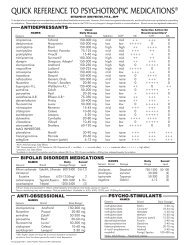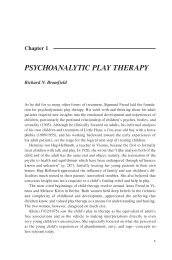IRAQ WAR CLINICIAN GUIDE
Iraq War Clinician's Guide - Network Of Care
Iraq War Clinician's Guide - Network Of Care
You also want an ePaper? Increase the reach of your titles
YUMPU automatically turns print PDFs into web optimized ePapers that Google loves.
Iraq War Clinician Guide 47 Medical Casualty Evacuees<br />
Routine screening. Proactive care of returning veterans will require that they be routinely screened<br />
for post-traumatic distress and mental health problems. In the absence of direct enquiry about<br />
distress and symptoms, it is likely that many individuals with significant problems will be missed.<br />
lraq War veterans, like other populations, cannot be expected to spontaneously disclose their<br />
distressing war experiences and associated problems. Several paper-and-pencil screens are<br />
available (see Assessment and Primary Care sections). It is important for mental health<br />
professionals to become a routine presence on medical and surgical settings. Rather than appear<br />
with a series of medical questions, it is more helpful to present as a member of the team who<br />
would like to be helpful and who has time to listen, answer questions, or help with a problem.<br />
This approach, sometimes referred to as "therapy by walking around," is consistent with the<br />
importance of not pathologizing reactions to overwhelming stress. It fosters trust and openness and<br />
still offers opportunities, if needed, for further assessment, triage, and treatment.<br />
Routine patient education. A good way to present services is to frame them as patient education in<br />
stress management. Patient education will offer a primary means of initiating proactive mental<br />
health care. Patients may differ greatly in their receptiveness to such discussions, and staff must<br />
remain sensitive to the state of readiness of each individual patient, and vary their approach and<br />
degree of discussion accordingly. However, it is important to initiate some discussion; failure to do<br />
so may encourage emotional avoidance and miss a significant and perhaps unique opportunity to<br />
offer preventive care. Group education "classes" can be helpful in making such discussions more<br />
acceptable to patients. They also provide opportunities for more receptive patients to model open<br />
communication and disclosure of personal stress reactions, thoughts, and feelings.<br />
Assessment. Administration of screening tools and patient education activities offer chances to<br />
determine which veterans will benefit from a more detailed assessment. Suggestions for the<br />
conduct of individual assessment are outlined in the Assessment section of this Guide, and the<br />
Instrumentation section draws attention to some useful assessment tools. In assessing stressors<br />
experienced in the war zone, clinicians should also take care to actively inquire about experiences<br />
associated with medical care and evacuation. Those being evacuated are often exposed to the<br />
suffering and death of other wounded vets. Preliminary work in the civilian sector suggests that the<br />
majority of injured patients values the opportunity to undergo a comprehensive psychosocial<br />
assessment during hospitalization, despite any inconvenience or distress caused by the process<br />
(Ruzek & Zatzick, 2000).<br />
Psychiatric consultation. In addition to their role in providing the various helping services listed in<br />
this section, consultation with psychiatry is especially important given the wide range of possible<br />
patient presentations and possible usefulness of psychotropic medications. In addition to<br />
ASDIPTSD, depression, and substance abuse, a large variety of mental health disorders (including<br />
other anxiety disorders, adjustment disorders, somatoform disorders, psychosomatic disorders,<br />
conversion disorders, dissociative amnesia disorder, and dissociative identity disorder) may be<br />
associated with exposure to combat and other war zone stressors. Medications may be useful in<br />
treating traumatic stress symptoms, associated disorders, and associated problems (e.g., sleep,<br />
nightmares). Mental health staff need to partner with MedlSurg nursing staff because these are the<br />
people who will know which patients are sleeping well, crying out in their dreams, having<br />
problems before or after family meetings, etc. Chaplain service is another valuable partner as they<br />
are a regular presence on MedISurg units and because military personnel are used to sharing<br />
stress-related issues with military chaplains. It is essential to promote a team approach in which<br />
mental health can be a full partner in the response to medical andlor surgical patients.<br />
DEPARTMENT OF VETERANS AFFAIRS<br />
NATIONAL CENTER FOR PTSD




